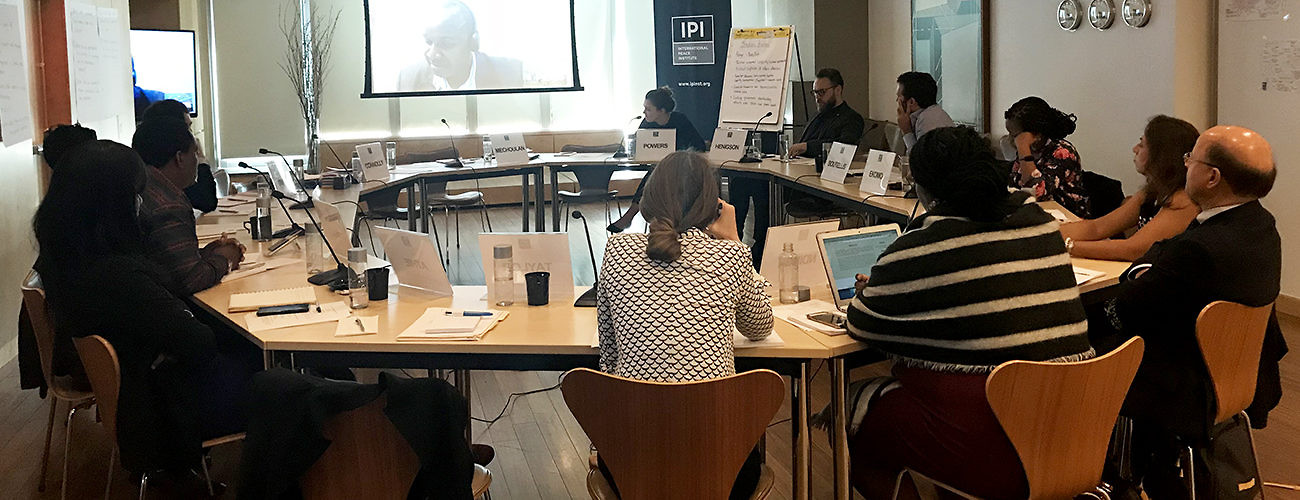On October 18th, IPI welcomed local peacebuilders from across the globe to examine how community-led peace networks can develop more inclusive and integrated peacebuilding processes.
At the roundtable authors’ workshop, six peacebuilders talked about their upcoming reports on peacebuilding networks in their case study countries. The event marks the conclusion of a two-year project with the Carnegie Foundation to explore local peace networks in eight case studies, examine how local and international peace actors can complement each other, broaden participation in peacebuilding programs, and improve overall peacebuilding outcomes.
Lesley Connolly, Policy Analyst at IPI and Youssef Mahmoud, IPI Senior Adviser, opened the event with a discussion on the relevance of sustaining peace at the local level, noting the shift from peacebuilding to sustaining peace at the United Nations following dual resolutions in the General Assembly and the Security Council on sustaining peace passed in 2015. The speakers underlined that sustaining peace is a long term process, not only for countries which have gone through conflict, but all countries, and requires inclusive participation at the local level.
The first session, chaired by Arthur Boutellis, Director of the Brian Urquhart Center for Peace Operations at IPI, featured presentations from Stephen Kirimi, Regional Programme Manager at the Life and Peace Institute in Ethiopia, Kessy Ekomo-Soignet, Executive Director of URU in Central African Republic and Dr. Webster Zambara, Institute for Justice and Reconciliation in South Africa. Each presenter shined a light on local peace networks in Kenya, Central African Republic, and Zimbabwe respectively.
Sarah Taylor, IPI Research Fellow, chaired the second session, which included presentations from Nicolas Chamat Matallana, Researcher at Centro de Recursos para el Analisis de Conflictos in Colombia, Hasini Haputhanthri, independent consultant on peacebuilding and reconciliation in Sri Lanka and Masana Ndinga, Senior Researcher at the Centre for the Study of Violence and Reconciliation in South Africa.
Two peace networks were showcased per country, each working on initiatives such as civic engagement, policy advocacy, women and youth engagement and conflict mapping and prevention. The commonality between all networks is that they strive to engage local communities in peacebuilding. The participants discussed the advantages and disadvantages of the network structure, as well as complex topics such as peacebuilding in conflict and post-conflict countries, avoiding political capture, and issues related to sustainable funding. Recommendations on how the international community could better support these networks’ work and how knowledge from local voices could be better integrated into the international community’s policies were also presented.
Lesley Connolly closed the event by emphasizing the value of peacebuilding networks in empowering local voices and bringing those perspectives to the United Nations policy community.
“Networks are able to connect to the debates and show the voices of local actors,” she said. “These networks help us understand what is working in society and how we can leverage this to sustain peace.”
She pointed out that we will only understand how to sustain peace in a society if we know what is working and how it is working.
“As the date of the Secretary General’s report on sustaining peace grows closer, the international community needs to identify, in practice, how to connect peace and development in a holistic manner,” she said.
“Building awareness for sustaining peace requires bringing voices from the field to this debate,” she said. “Sustaining peace is ultimately a shared task and should include a broad range of views and voices, especially of those impacted by violent conflict and currently working to prevent it.”
“Without investing in strengthening local peace capacities, even the most aspirational declarations at the UN and in capitals around the world will fail.”








